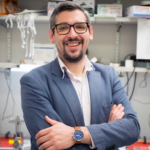M.S. Research Mentors
- Primary Faculty
- Ph.D. Thesis Mentors
- M.S. Research Mentors
The faculty below have previously served as mentors for MS students engaging in research in our department. Availability to mentor is at the discretion of the faculty member and is dependent on multiple factors.
GERARD AHERN: ION CHANNELS AND SENSORY RECEPTORS

Professor, Pharmacology and Physiology
Ahern Lab
gpa3@georgetown.edu
Office: Med-Dent SW401
Lab: Med-Dent SW402
Education: BSc (Hons), 1990, LL. B., 1991, University of Canterbury (New Zealand); PhD, 1996, Australian National University (Australia)
Current Research: How do cells detect changes in the external or extracellular environment? We are interested in the fundamental mechanisms that allow cells to sense diverse chemical or physical stimuli. Our focus is a class of membrane ion channels called “Transient Receptor Potential” (TRP) channels. We also explore novel ligand signaling at G-protein coupled receptors both in neurons and immune cells. We use a combination of electrophysiological, cell imaging, genetic and biochemical techniques, and where possible, appropriate animal models.
Available for research rotations during 2024-2025, likely to accept new thesis students in 2025.
TINATIN I. BRELIDZE: STRUCTURE AND FUNCTION OF ION CHANNELS

Associate Professor, Pharmacology and Physiology
Brelidze Lab
tib5@georgetown.edu
(202) 687-6178
Office: Med-Dent SE406
Lab: Med-Dent SE406
Education: Diploma in Physics (Hons), Tbilisi State University (Georgia), 1996; Ph.D. Physiology & Biophysics, University of Miami, 2003
Current Research: Ion channels are integral membrane proteins that regulate the passage of ions through cell membranes. Ion channels are essential for physiological function of living cells and abnormalities in ion channel function or expression pattern are often linked to inherited or acquired diseases. The research in my laboratory is focused on studies of mechanisms responsible for opening and closing of ion channels, identification of novel ion channel regulators and investigation of therapeutic potential of ion channel regulators. In our studies we use a variety of methods, including electrophysiology, biochemistry techniques, fluorescence-based methods, and zebrafish and rodent animal models.
HONG-YUAN CHU

Associate Professor, Pharmacology and Physiology
hc948@georgetown.edu
Lab Website
Office: Med-Dent NW410
Education: Ph.D., Neuropharmacology, Shanghai Institute of Materia Medica, Chinese Academy of Sciences, 2010
Current Responsibilities: Parkinson’s disease is characterized by the progressive degeneration of midbrain cells that produce and release dopamine and the accumulation of insoluble protein aggregates. Loss of dopamine-producing cells dramatically affect how the brain controls behaviors, leading to the manifestation of the feature parkinsonian motor symptoms, including the slowness, or even the absence, of motor activities. The accumulation and propagation of insoluble protein aggregates has been closely associated with the pathogenesis and progression of the disease. Our lab research focuses on understanding how the loss of dopamine and/or presence of protein aggregates may impact normal function of the brain circuits, which in turn leads to numerous aspects of motor and nonmotor defects in parkinsonism.
The lab is accepting students for rotations and thesis work.
GHAZAUL DEZFULI: NICOTINIC RECEPTORS IN ENERGY HOMEOSTASIS

Co-Director, MS in Pharmacology;
Associate Professor, Pharmacology and Physiology
gd96@georgetown.edu
(202) 687-1091
Office: Med-Dent NW407
Lab: Med-Dent NW409, NW411
Education: Ph.D. (Neuroscience) Georgetown University, 2014
Current Research: My research focuses on how nicotine and selective nicotinic like drugs cause weight loss. Specifically, I am interested in understanding the critical role of nicotinic receptor desensitization in body weight regulation. Animal models of obesity, selective nicotinic-like drugs (agonists and antagonists), in vivo drug administration protocols, metabolic phenotyping, as well as more recently radioligand binding assays are used. The aim of this research is to apply our understanding of how nicotine is able to lower body weight and suppress food intake toward development of nicotine-based therapeutics for weight loss.
PATRICK A. FORCELLI: NEUROPHARMACOLOGY AND NEURAL CIRCUITS OF EPILEPSY

Director, PhD in Pharmacology & Physiology;
Professor, Pharmacology & Physiology
Website
paf22@georgetown.edu
202-687-7825
Office: NRB W214
Education: Ph.D. (Neuroscience), Georgetown University, 2011
Current Research: Research in the laboratory focuses on the neural circuitry underlying seizure propagation, complex behaviors, and the pharmacological treatment of neonatal seizures. We use a combination of approaches ranging from biochemistry and histology to neurophysiology (in slice and in intact animals) to behavioral monitoring and circuit manipulation (pharmacological, optogenetic, chemogenetic) to neuroimaging.
ADRIANE FUGH-BERMAN: PHARMACEUTICAL MARKETING, DIETARY SUPPLEMENTS, HERBS

Professor, Pharmacology & Physiology
Website
ajf29@georgetown.edu
202-687-7845
Office: NRB W215
Education: M.D., Georgetown University, 1988
Current Research: I direct PharmedOut , a research and education project that promotes rational prescribing practices. I research industry marketing techniques and how they interact with the culture of medicine, and teach physicians, other health care providers, graduate and medical students about clinical trials and evidence-based prescribing. I also teach about the risks and benefits of botanical medicines and dietary supplements, and direct the Urban Herbs project, an ecologic gardening project with various demonstration gardens on the GUMC campus. With Dr. Tom Sherman, I co-direct a new track in Natural Products within the masters program in pharmacology. I also direct theUrban Herbs project on the Georgetown campus. This is a garden project illustrating many medicinal plants.
NADY GOLESTANEH: AGE-RELATED MACULAR DEGENERATION

Associate Professor, Opthalmology, Neurology, & Biochemistry
PubMed search for publications
ncg8@georgetown.edu
(202) 687-8324
Office: Med/Dent NE203
Current Research: My research focuses on age-related macular degeneration (AMD). AMD is a devastating neurodegenerative disease and the leading cause of blindness in the elderly. More than 11 million Americans over the age of 50 are affected by AMD, and with an aging population, this number is expected to double by 2050. My research program involves three complementary areas in AMD, 1) investigating the underlying mechanism of AMD using adult stem cells and In vitro disease modeling, 2) establishment of new animal models to study AMD and test novel drugs in vivo, and 3) investigating how aging mechanisms can induce retinal degeneration and AMD.
KEN KELLAR: NICOTINIC ACETYLCHOLINE RECEPTORS IN CNS AND PERIPHERAL NERVOUS SYSTEM

Professor & Chair, Department of Pharmacology & Physiology
Lab Website
kellark@georgetown.edu
(202) 687-1032
Office: Medical Dental Bldg SE402
Lab: Medical Dental Bldg NE416-420
Education: Ph.D., Pharmacology, The Ohio State University, 1974
Current Research: My laboratory studies the subunit composition, pharmacological properties and regulation of neuronal nicotinic receptors. We are particularly interested in understanding the importance of desensitization of these receptors and the mechanisms by which chronic exposure to nicotine increases these receptors in brain.
LUDISE MALKOVA: NEURAL SUBSTRATES OF EMOTIONAL AND SOCIAL BEHAVIOR IN ANIMAL MODELS
Professor, Pharmacology
malkoval@georgetown.edu
(202) 687-0224
Office: NRB, W209B
Lab: DCM
Education: BA, MA Charles University Prague, Czech Republic; Ph.D. (1986) Czechoslovak Academy Sciences, Prague, Czech Republic
Current Research: Neural substrates of social and emotional behavior; the role of the amygdala and orbitofrontal cortex in processing reward; medial temporal lobe structures (hippocampus, perirhinal cortex) and cognitive functions (object recognition and spatial memory); amygdala and midbrain (superior colliculus) interactions; autism, PTSD; reversible pharmacological manipulations of discrete brain structures, systemic drug effects.
SREEJITH J NAIR: SPATIO-TEMPORAL CONTROL OF GENE EXPRESSION IN CANCER AND DEVELOPMENT
Assistant Professor, Oncology and Lombardi Comprehensive Cancer Center sn778@georgetown.edu
202-687-7887
Office: NRB E308
Education: Ph.D. (Molecular Biology), UT Health Science Center San Antonio, 2012
More than 98% of the human genome does not code for any proteins, but they play crucial roles in normal physiology and diseases by controlling gene expression. The regulatory functions of the “non-coding genome” are primarily attributed to the RNAs produced from these regions (non-coding RNAs) and also gene regulation mediated by transcriptional enhancers. The mechanism of regulatory communication between protein-coding and non-coding genomic regions is largely unknown. In the lab, we use cutting-edge molecular biology, genomics, biophysics, and microscopy tools to study the mechanism of gene regulation by non-coding genomic elements. Our recent findings support the view that acute signaling events lead to the assembly of transcription complexes as liquid-like membraneless structures known as biomolecular condensates. Transcriptional condensates are RNA-protein complexes that have been shown to control gene expression, organize chromatin structure, and facilitate the recruitment of several anticancer drugs to the chromatin. We explore the biological and pharmacological role of these assemblies in vitro and in vivo by examining the biochemistry and biophysics of proteins and RNAs involved in the process.
ALEXEY OSTROUMOV: MECHANISMS OF NEUROPSYCHIATRIC DISORDERS

Assistant Professor, Pharmacology and Physiology
Website
PubMed search for publications
Office: W224A NRB
Education: PhD, International School for Advanced Studies (SISSA, Italy), 2010
Current Research: Our main goal is to understand the causal mechanisms, by which modifications in synaptic plasticity contribute to neural circuit remodeling and aberrant behaviors associated with neuropsychiatric disorders. To this end, we combine slice and in vivo neurophysiology with viral-genetic and behavioral approaches.
DANIEL PAK: MOLECULAR MECHANISMS OF SYNAPTIC PLASTICITY

Professor, Pharmacology and Physiology
Molecular Neurobiology of Memory [mNeMe]
dtp6@georgetown.edu
(202) 687-8750
Office: SW407 Med/Dent
Lab: SW406 Med/Dent
Education: Harvard University, B.A., 1991; University of California at Berkeley, PhD, 1996
Current Research: My laboratory is interested in the molecular changes that occur at CNS synapses in response to experience. We utilize a combination of approaches ranging from molecular biology and biochemistry to cell biology, imaging, and mouse genetics to address three major questions: 1) how do neurons encode long-term storage of information? 2) how do neurons maintain stability of function by homeostatic synaptic plasticity mechanisms? and 3) how does failure of these mechanisms contribute to neurological and neurodegenerative disorders?
KATHRYN SANDBERG: ANGIOTENSIN RECEPTOR SIGNALING AND TRAFFICKING

Click for a complete list of published work in MyBiblography.
Professor, Division of Nephrology & Hypertension, Department of Medicine
Website
sandberg@georgetown.edu
(202) 687-3010
Office: 232 Bldg D
Education: Ph.D. (Biochemistry), University of Maryland, 1987
Current Research: 1. Angiotensin receptor signaling and trafficking: The angiotensin type 1 receptor is a peptide hormone G protein-coupled receptor that is widely targeted to treat hypertension. We previously discovered that RNA binding proteins regulate the function of the rat type 1a receptor (AT1aR) by selectively binding within exon 2 of the receptor 5′-leader sequence and that this translational regulation is mediated by a short open reading frame in exon 2. More recently, this research direction has led to the exciting discovery of a seven amino acid peptide (PEP7) encoded within a short open reading frame in exon 2, which is a selective inhibitor of AT1aR signaling; PEP7 inhibits the Erk1/2 but not the classic inositol trisphosphate pathway. PEP7 may also contribute to age-related impairments in urine-concentrating mechanisms and modulates AT1aR trafficking. We study AT1aR signal transduction by conducting enzyme and radioligand binding assays as well as by measuring signaling molecules on Western blots. AT1aR trafficking is investigated using live cell imaging and confocal microscopy in cells transfected with wildtype and site-directed mutants of the AT1aR.
2. Immune system and hypertension: Our laboratory investigates T cell mechanisms underlying the susceptibility and resilience to developing hypertension. We have found that male T cells exacerbate hypertension in an induced model of hypertension in the male mouse but are unable to achieve the same magnitude of hypertension in the female. Furthermore, female T cells are not able to contribute to hypertension in the male mouse. These findings indicate biological sex is a critical determinant in T cell differentiation and/or function. We are currently investigating how gonadal hormones and sex chromosomes affect sex-specific T cell function in models of hypertension and associated vascular and renal disease. We study blood pressure and heart rate by radiotelemetry in conscious mice and rats. T cell expression and function is assessed by flow cytometry and cytokine production in the Dahl rat model, gene-specific knockout mice and the four core genotype mouse model that enables separation of sex chromosomes from gonadal hormones.
3. Ovarian hormone loss, physical activity, blood pressure and cognition: Recent laboratory studies focus on the physical and cognitive effects of bilateral oophorectomy prior to the age of natural menopause. The resulting sudden ovarian hormone loss accelerates the age-associated development of hypertension and cognitive decline. We are also studying how physical activity and blood pressure can modulate cognitive decline in this model. Physical activity is controlled using voluntary and forced running wheels. Cognition is assessed by a 12 arm radial maze and novel object recognition tests. In addition, we are studying these questions through human subject research using wireless technology, home blood pressure, heart rate and pulse wave velocity monitors in conjunction with consumer activity trackers.
YUICHIRO SUZUKI: REDOX SIGNALING; PULMONARY HYPERTENSION & RIGHT HEART FAILURE

Professor, Pharmacology & Physiology
Homepage
ys82@georgetown.edu
(202) 687-8090
Office: NW402a Med/Dent
Lab: NW403 Med/Dent
Education: PhD, Medical College of Virginia,1991
Current Research: The general goal of my laboratory is to investigate signal transduction mechanisms for cardiac and smooth muscle cell regulation in order to develop therapeutic strategies against various heart and lung diseases. I have a long-standing interest in how redox processes regulate cell signaling, and my laboratory continues to contribute to the understanding of the mechanism of redox signaling. Another major focus of my laboratory is to study mechanisms of cell growth and death in pulmonary vascular smooth muscle and right heart muscle. We seek to develop therapeutic strategies to treat pulmonary hypertension patients, without adversely affecting the weakened right heart.
STEFANO VICINI: LIGAND GATED CHANNELS AT CENTRAL SYNAPSES

Professor, Pharmacology & Physiology
Vicini Lab Website
svicin01@georgetown.edu
(202) 687-6441
Office: BSB, 225
Lab: BSB, 228-230
Education: Ph.D., U Torino, Italy, 1979
Current Research: Using transgenic mice with the two major striatal output pathways labeled we are answering a fundamental question: What role tonic and phasic GABA and NMDA conductance plays in striatal disorders? We are studying the functional consequence of the activation of distinct dopamine receptors on NMDA and GABAa receptor subtypes. Our study has great potential to identify novel therapeutic targets for treating disorders associated with striatal dysfunction including Parkinson’s disease, Huntington’s disease, tardive dyskinesia, Tourette’s syndrome and drug addiction.
TINGTING WANG: SYNAPTIC HOMEOSTATIC PLASTICITY IN HEALTH AND DISEASE

Assistant Professor, Pharmacology & Physiology
Wang Lab Website
tw652@georgetown.edu
(202) 687-1099
Office: SE407 Med/Dent
Lab: SE407 Med/Dent
202-687-1550
Education: Ph.D., Neurobiology, Duke University, 2009
Current Research: The brain is incredibly complex and malleable in terms of developmental and learning-related plasticity. Homeostatic signaling systems act to stabilize the function of individual nerve cells and neural circuitry, thereby ensuring robust and reproducible brain function and behavior throughout life. My laboratory investigates the molecular mechanisms that underlie the homeostatic control of the nervous system and studies how impaired homeostatic plasticity is involved in neurological, neuropsychiatric and neurodegenerative disorders. We are particularly interested in the intercellular signals that convey information between neurons and glia during homeostatic plasticity. We use an array of cutting-edge electrophysiological, imaging, molecular and genetic tools in Drosophila melanogaster and mice to address:
1. What is the signaling function of glia in synaptic homeostatic plasticity?
2. How does dynamic regulation of extracellular matrix (ECM) and adhesion molecules modulate synaptic transmission?
3. How do genetic mutations and failed homeostasis contribute to neurological and psychiatric diseases, such as epilepsy, autism spectrum disorders and Alzheimer’s Disease?
